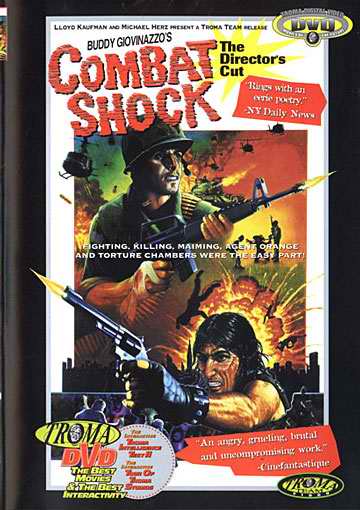 “Combat Shock” is a nihilistic, ugly, uncompromising, bleak and brilliant experience. Buddy Giovinazzo has created a movie that is a punch in the gut for an experimental audience that can’t really judge it based on the sloppy marketing work from Troma studios. The initial poster for the picture gave the misleading impression that this was another “Missing in Action” clone from the late ‘80s, but so much more lies underneath the bleak surface of “Combat Shock.”
“Combat Shock” is a nihilistic, ugly, uncompromising, bleak and brilliant experience. Buddy Giovinazzo has created a movie that is a punch in the gut for an experimental audience that can’t really judge it based on the sloppy marketing work from Troma studios. The initial poster for the picture gave the misleading impression that this was another “Missing in Action” clone from the late ‘80s, but so much more lies underneath the bleak surface of “Combat Shock.”
Frankie Dunlan (Ricky Giovinazzo, the brother of the director) cannot shake the horrors of Vietnam from his psyche and nightmares. However, the nightmare continues when he wakes up, because he is living in poverty and can’t afford food for his wife and baby. What’s worse is that the baby is deformed because of the Agent Orange he was exposed to as a soldier in Vietnam. (The mutant baby is one of the strangest moments in the history of Troma.)
In an effort to find hope and solace in the streets, Dunlan walks the streets as a hopeless emotional zombie in hopes of finding work or money for food. This bleak day holds no solace for Dunlan, who is beat up by loan sharks, witnesses children selling themselves on the streets and is forced to watch his childhood friend become a desperate junkie. He is living in hell with no clear escape.
Buddy Giovinazzo has created a masterpiece of human horror that suffers from some small budget constraints. The direction is great, and actual studio backing could have made the movie more akin to his big vision, but a studio would have never allowed a movie this bleak to have been made – it would have been made into a glossy picture with a happy ending.
The film has a way of draining the life out of you as you walk the streets with Dunlan, and you empathize with him in such a strong way. Nothing separates this main character from the audience, and it proves that under extreme circumstances, any one of us could snap. The fundamental notions that hold us together, when taken away, could drive us into the depths of madness.
With the exception of Giovinazzo, most of the actors come off amateurish, but his performance is crucial to the piece and he conveys enough emotions that you could overlook the supporting actors’ lack of talent. The camera follows Dunlan on the grimy streets of hell with his greasy hair, worn-down clothes and an appearance that suggests he hasn’t showered in months. He paints the portrait of man living and sleeping in hell.
The only other good supporting actor is Michael Tierno, who plays Mike the childhood friend turned hapless heroin junkie.
What is amazing is that this movie is a single vision that never sells out the true meaning or provide a happy ending, which would never work for these characters. The ending is the most brutal part of the picture, but we know that throughout this shocking day that it is what the movie was leading up to.
A version of “Combat Shock” recently surfaced on DVD entitled “American Nightmare,” which is the way the director intended it. The Troma logo as been removed at the beginning, and the stock footage of war has been removed, creating an even bleaker sense to the picture. This is not a Troma picture, but something the studio picked up and handled the releasing, so it packs a wallop with none of the corny humor the studio is known for. For that reason alone, it puts the picture on par with “Def by Temptation” as the best to come from early Troma. Troma films have always been enjoyable, but there is something serious to be said in this picture, and it’s in a league different from what it were producing at that time.
The movie also follows the three-act setup of the screenplay structure, giving a setup, a bleak series of confrontation and the most nihilistic ending in the history of cinema. You have never seen anything like it before, and it proves that we need more films from this director.
“Combat Shock” (or “American Nightmare”) is proof that not everything that played on 42nd Street should be dismissed, and that some of these filmmakers had important stories to tell. Some of these important stories took into the darkest corners of the human experience, and are something that we need to be informed about every so often.
Walk the streets with Dunlan, if you feel you can mentally handle it.

Leave a Reply